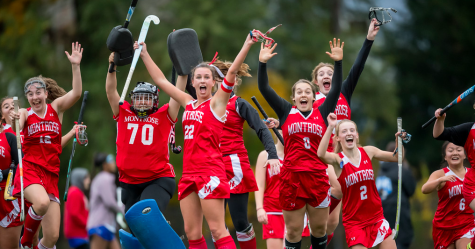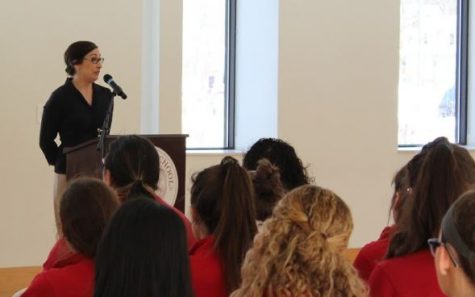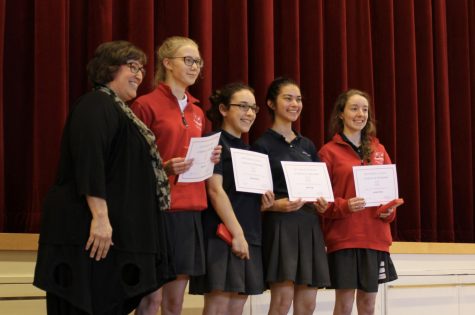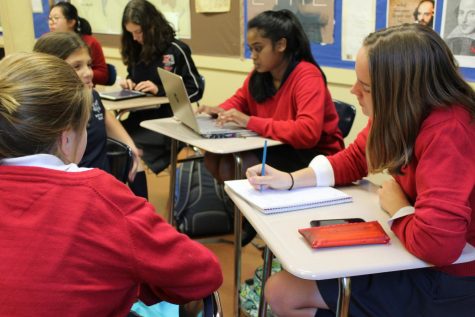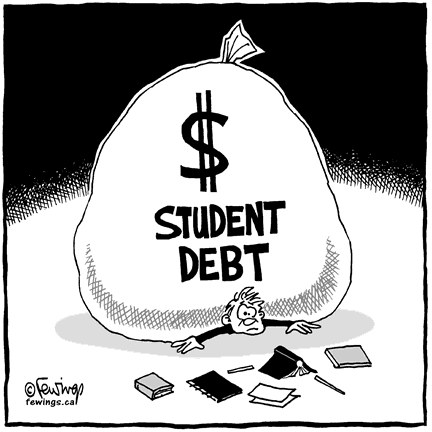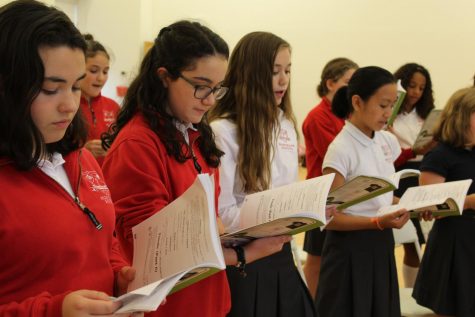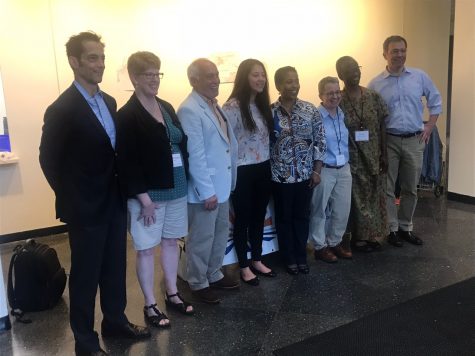We Gave Up Social Media for a Week and Here’s What We Learned
The Motivation
Mariel Rosati ’19
Walk down the street and you will find groups of kids, teenagers, and adults glued to their cell phones. Restaurants, schools, and even restrooms are plagued by the cell phone craze, an addiction that was not present just 10 years ago. Social media and technology consume the thoughts and actions of our generation. After reading The Flight From Conversation by psychologist and M.I.T. professor Sherry Turkle, I became more aware of declining communication skills among many teenagers today. One teenager Turkle met revealed the seriousness of his social discomfort when he said: “Someday, someday, but certainly not now, I’d like to learn how to have a conversation.”
Members of the 10th grade Journalism class — including myself, Tory Krechting ‘19, Meagan Flynn ‘19, Abigail Finnerty ‘19, and Maddie Marcucci ‘19 along with other student volunteers — decided to give up social media the October 11-14 school week. This challenge encouraged girls to participate in more face-to-face conversations and to resist procrastination induced by social media. The experiment, complete with daily check-in via “vlogs,” proved difficult for some, but effective for all. Social media, while entertaining, limits individual thought and human interaction. Many students found this “app-free” week an eye-opening experience, allowing them to discover that there is much more to life than a phone. It’s what lays beyond the touch screen that really matters. The students who gave up social media shared their experiences.
Apprehension and Surprise
Tory Krechting ‘19
Most of us approached this challenge as typical teenagers with a growing addiction and dependence on social media. We were scared, filled with dread, apprehensive and prepared to be bored out of our minds. When presented with this idea, we fearfully accepted and unknowingly overestimated the challenge posed to us. In the middle of the week, I felt more productive, more connected to other people, and surprisingly at peace with not consistently having Twitter, Instagram or Snapchat to turn to in moments of boredom. Even more surprisingly, near the end of the week, I found that I didn’t want to go on social media as often as usual (although I still did want to check my accounts). Overall, the social media-free week was a great experiment for me to try out, and I enjoyed being connected to the world without the distraction of my apps constantly looming over me.
The Results
Meagan Flynn ‘19
Following our social media free week, we gained access to our phones on Saturday morning, October 15th. We found that we had learned a variety of lessons and techniques to help us with daily life, especially at school. On the post-survey, Maddie Marcucci ‘19 noted that “the experiment helped me to be more efficient and have better work to hand in.” While not everyone saw direct results, a number of participants did find the experiment useful; some participants, for example, found that they got to bed earlier that week.
“What was the best and worst part of the week?” Tory ‘19 answered: “Worst part of the week was finding out about this challenge and being scared of it. Best part of the week was realizing that I could get my homework done a lot faster and easier without social media as a procrastination tool.” Many participants found it hard not to be able to check social media posts, and one noted that “the worst part was not knowing what went on in the world.” However, they were also proud of the great focus and effort they put into their school work.
But was this just a “one and done” event? Or will the results endure? All participants agreed they would continue using social media less often and were interested in participating in the challenge again. The difficult challenge sent us into new territory, but everyone agreed that the experiment was interesting to try and yielded ideas to apply in the future.
Better Focus and Better Work
Maddie Marcucci ‘19
Throughout this week, having no social media has made my school work significantly more efficient than when I access social media. I have been able to get my homework done in more consistent chunks, rather than taking breaks in the middle of an assignment. Therefore, I am able to do each assignment more thoroughly and I have been able to do some of my best work this week. Usually, I tend to take breaks to look at Instagram in the middle of an assignment, especially for the subjects that I don’t enjoy doing. But without Instagram, I had fewer opportunities to procrastinate. Even though I discovered new ways to procrastinate, the school work I did this week was some of my best work this year, and I believe it is because of the absence of social media.
The Realization
Abigail Finnerty ‘19
When I first decided to go social media free for a week, I admittedly was very worried. Social media is a big part of my life, and to take out that part, I wasn’t sure what I would do instead. However, I rediscovered my love for reading. Instead of checking Instagram, or responding to Snapchats, I went to the Hingham Public Library and checked out seven books. I read more than I ever had in recent memory. While reading, I noticed my mind was clearer and I was really comprehending what I was reading. Normally, if I read at all, I would check my phone every few pages. Without social media, I was able read a short novel in one night!
Throughout the week, I noticed how much better my life was without social media, so I decided continue my social media cleanse into Saturday. On Saturday, I ventured back to my old school, Hingham High, to meet with some old friends and attend Homecoming. I noticed the limited amount of conversation that was happening. People were sitting next to each in silence because they were so enwrapped by the social media on their phone. My friend who invited me only said three sentences, and then went back to scrolling aimlessly on her phone.
I was disappointed to discover that Sherry Turkle was right. Our generation is too focused on social media and how we appear online. Real conversation is dying, and I’m proud to say that I and everyone else who participated in the social media free week have revived the art of conversation. I definitely don’t have any regrets about deciding to go social media free for a week!
The Afterword
Mariel Rosati ‘19
Following this challenge, it was refreshing to go a week without the constant need to reach for my phone. I will say that I am not as “addicted” to social media as others, but nevertheless I gained a sense of fulfillment from this accomplishment. Another social media free week is definitely a possibility in the future, and of course we will be open to more participants. Two weeks after the challenge’s end, I am finding myself more productive and efficient in my schoolwork.
This may be a coincidence, but I do catch myself spending less and less time on networking sites. I actually read a whole book – front to back – in one night that week, something I haven’t had the time to do in a while. Procrastination will not suddenly disappear when social media is gone. The source of procrastination can simply change; it’s up to us to push aside distractions and focus on schoolwork. While I will most likely continue using social media in the future, this challenge allowed me to value true friendships and real, in-person conversation.



